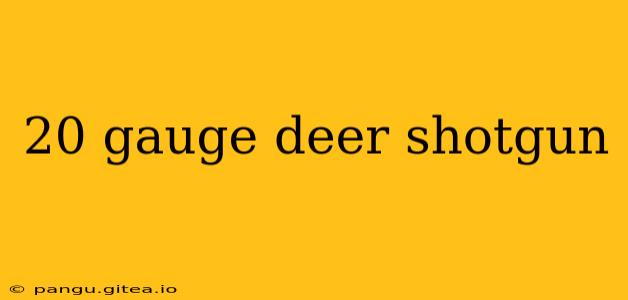The 20 gauge shotgun, often overlooked in favor of its bigger brothers, the 12 and 20 gauge, presents a compelling option for deer hunting, especially for hunters prioritizing recoil reduction and maneuverability. This article delves into the practicality of using a 20 gauge for deer hunting, exploring its advantages, disadvantages, and crucial considerations for ethical and successful harvests.
Advantages of a 20 Gauge for Deer Hunting
-
Reduced Recoil: This is perhaps the most significant advantage. The lighter recoil makes for a more pleasant shooting experience, allowing for faster follow-up shots and improved accuracy, particularly beneficial for less experienced hunters or those with shoulder sensitivity. This translates to more comfortable extended hunting sessions.
-
Lighter Weight: 20 gauge shotguns are generally lighter than their 12 gauge counterparts. This translates to less fatigue during long hunts, particularly when navigating challenging terrain. A lighter gun is also easier to maneuver in dense cover, providing a significant advantage when stalking whitetail deer.
-
Improved Accuracy: The reduced recoil contributes to improved accuracy, as the shooter's aim isn't disrupted by the powerful kick of a heavier gauge. This is especially critical for longer shots.
-
More Shots: Some hunters choose to carry more rounds with a 20 gauge because of its lighter weight and reduced recoil. This could prove advantageous when multiple shots are needed.
-
More Ammunition Options: While not as extensive as 12 gauge options, the 20 gauge still offers a decent selection of slugs and buckshot loads specifically designed for deer hunting.
Disadvantages of a 20 Gauge for Deer Hunting
-
Less Stopping Power: This is the primary concern with the 20 gauge. Compared to a 12 gauge, the smaller bore diameter means less overall energy transfer to the target. This requires more precise shot placement for a clean, ethical kill.
-
Limited Range: The reduced energy also affects effective range. While suitable for shots within reasonable distances, longer-range shots may prove less effective compared to a 12 gauge.
-
Finding the Right Ammunition: It's crucial to select high-quality, properly designed ammunition for deer hunting. Not all 20 gauge slugs and buckshot are created equal. Research and testing are essential to find ammunition that performs consistently and delivers reliable stopping power within your ethical hunting range.
Choosing the Right 20 Gauge Deer Shotgun and Ammunition
Selecting the right 20 gauge shotgun and ammunition is paramount for success and ethical hunting practices. Consider these factors:
-
Slug vs. Buckshot: Both offer viable options, but slugs are generally preferred for their accuracy at longer ranges. Buckshot offers a wider spread, potentially beneficial at closer ranges.
-
Choke Tube: The choke tube significantly impacts shot pattern. A modified or improved cylinder choke is generally recommended for slugs. For buckshot, a modified choke may be suitable.
-
Barrel Length: A longer barrel generally improves accuracy, but a shorter barrel offers greater maneuverability. Find a balance that suits your hunting style and typical shooting distances.
-
Ammunition Testing: Before the hunting season, it's crucial to thoroughly test your chosen ammunition to verify accuracy and pattern at various ranges.
Ethical Considerations
Using a 20 gauge for deer hunting requires a higher degree of precision and shot placement due to its lower stopping power. Hunters must be confident in their shooting abilities and use appropriate ranges to ensure a quick, clean, and ethical harvest. Understanding your limitations and the capabilities of your weapon is paramount for ethical hunting.
Conclusion
The 20 gauge shotgun can be a practical and effective choice for deer hunting, particularly for hunters prioritizing reduced recoil and maneuverability. However, responsible hunters must understand its limitations and carefully select appropriate ammunition and practice diligently to ensure ethical and successful hunts. By carefully considering the advantages, disadvantages, and ethical implications, hunters can make an informed decision on whether the 20 gauge is the right choice for their hunting style and circumstances.
